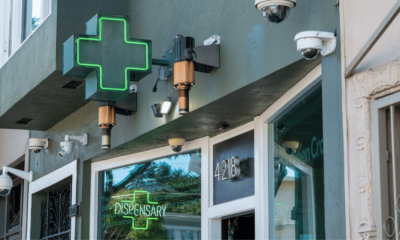Mum-of-five Kayleigh Compston is the first Scottish patient to be legally prescribed medical cannabis as part of Project Twenty21. Now she’s speaking out to tackle the stigma.
“Medical cannabis has one hundred percent made me a better mum,” says 26-year-old Kayleigh Compston.
A mum-of-five, she has recently become the first person in Scotland to be prescribed cannabis legally, having enrolled in Project Twenty21, the pioneering study led by Dr David Nutt.
Kayleigh, who has fibromyalgia and functional neurological disorder (FND), which cause chronic pain, paralysis and muscle spasms, had spent years being prescribed heavy opiates such as morphine to manage her symptoms.
But now she says medical cannabis has allowed her to feel human again.
“There have been no negative side effects from cannabis whereas with pharmaceuticals there were many,” says Kayleigh, who lives in the Shetland Islands with her partner Matthew Ross and is mum to Tyler, nine, Teegan, eight, Tommy-Lee, seven, Teejay, five and Tianna, four.
“The issue with opiates is that your body gets used to it, so the doses get higher and higher and stronger and stronger.
“Now I’m not a zombie anymore, I lead a much more normal life.”
Kayleigh, whose conditions have been known to leave her bed-bound, continues: “It doesn’t take away the symptoms, but it helps you to forget about them and it relaxes my muscles spasms.
“It’s actually made me feel human and I’ve been able to get on with doing things for my kids,” she continues.
“It’s nice to be able to play games with them and drop them off at school – things which I couldn’t do when I was paralysed in bed for months.”
Kayleigh says she is also less reliant on Matthew now, who is her full-time carer.
“It’s hard work with the kids and I still have to rely on him for things, but much less so.”
And the cannabis – which she grinds and vapes in a herbal vaporizer eight times a day – also helps relieve her symptoms of anxiety and PTSD.
Matthew, 25, is also enrolled in Project Twenty21 and previously had a private prescription for medical cannabis to help manage his Multiple Sclerosis (MS).
The project is aiming to enrol 20,000 patients by the end of 2021, creating the largest body of evidence for the effectiveness of medical cannabis. Its goal is to demonstrate to policymakers that medical cannabis should be as widely available, and affordable, as other approved medicines for patients who would benefit from them.
Project Twenty21 is covering the costs of a private prescription up to £150 per product per month for those with Anxiety Disorder, Chronic Pain, MS, PTSD, Substance Use Disorder (as a harm reduction strategy) and Tourette’s Syndrome and researchers will collect data about their quality of life for up to two years.
It is hoped that the findings will make a powerful case for NHS funding.
Despite first trying weed as a curious teenager, Kayleigh never thought about it medically until a few years ago and admits to self-prescribing in an attempt to find an alternative to opiates.
Now they have legal prescriptions, the couple are advocating for wider access to medical cannabis and are keen to speak out to help change attitudes in their home country.
“I feel like the Shetland Islands are quite behind anyway, and some of the older generation still have outdated views,” says Kayleigh.
“There is still a stigma, but I think people need to open their eyes and realise that all the evidence is out there as to how much it actually changes people’s lives.”
“Like any medication, it can have side effects but it’s not what people say it is.”
Kayleigh is starting her education close to home, by being open with her children about her prescription.
“My older three children know what my medication is now. It’s about educating them that cannabis is a medication, just like any of the others I have taken.
“I wanted them to know before they get told that it’s ‘bad’.
She adds: “The children have seen how much better quality of life I have now.
“They know first-hand how much it has helped mummy.”
For more information about Project Twenty21 visit www.drugscience.org.uk/twenty21-is-now-live

 News6 months ago
News6 months ago
 Science5 months ago
Science5 months ago
 Industry6 months ago
Industry6 months ago
 News6 months ago
News6 months ago
 News5 months ago
News5 months ago
 Health4 months ago
Health4 months ago
 News5 months ago
News5 months ago
 Health3 months ago
Health3 months ago












